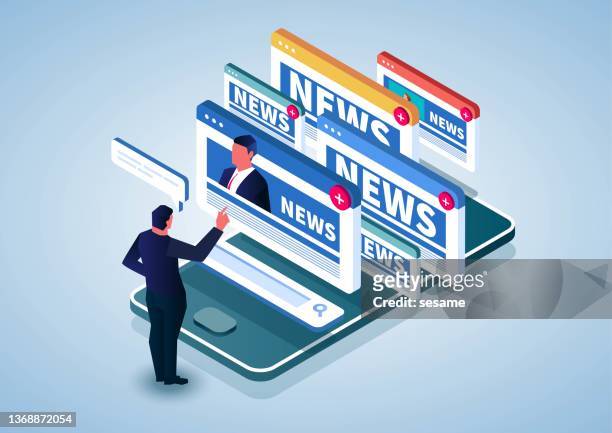The Significance of Fact-Checking on the planet of News Online
The occurrence of misinformation in today's online news landscape has gotten to disconcerting degrees. Fact-checking companies play a vital function in counteracting this trend. They validate cases and improve the credibility of journalism. The effectiveness of these companies usually hinges on their approaches and public understanding. As target markets browse this complex atmosphere, the ramifications of their findings may form the future of news consumption and trust. What does this mean for the integrity of details moving on?

The Increase of False Information in the Digital Age
Just how has the arrival of digital modern technology contributed to the spread of false information? The quick growth of the internet and social media systems has assisted in the dissemination of details at an extraordinary rate. Users can share articles, video clips, and opinions with a mere click, usually without confirming the material's accuracy. Algorithms focus on mind-blowing or emotionally charged product, leading to an expansion of deceptive stories that record attention.
Additionally, the privacy afforded by electronic systems permits people to spread incorrect details without responsibility (stnews.live). Misinformation thrives in resemble chambers, where individuals are subjected mainly to perspectives that strengthen their ideas, additionally setting fallacies. The saturation of info can bewilder users, making it testing to recognize reputable sources from undependable ones. False information has actually come to be a pervasive problem in the digital landscape, affecting public opinion and count on in genuine news sources.
The Function of Fact-Checking Organizations
Fact-checking companies play an important duty in improving the reliability of journalism by confirming cases made in news reports. Their initiatives are important in combating false information, making sure that accurate details dominates in the digital landscape. By holding media outlets liable, these organizations contribute substantially to educated public discourse.
Enhancing Reputation in Journalism
While false information proliferates in the electronic age, fact-checking companies play an important function in improving the reliability of journalism. These organizations carefully validate cases made in news articles, public statements, and social media sites posts, making sure that info disseminated to the public is precise and reliable. By giving independent assessments, they work as an essential resource for journalists, helping them maintain high criteria of stability. Furthermore, their initiatives advertise transparency in media, promoting public count on. As audiences come to be significantly discerning, the presence of reputable fact-checking entities can identify reliable news sources from those that may spread falsehoods. Eventually, the dedication of fact-checking organizations to maintain truthfulness is important for the health of autonomous discussion.
Combating False Information Efficiently
As false information proceeds to spread out quickly across digital systems, the function of fact-checking organizations ends up being increasingly important in the battle for accurate details. These companies function as guard dogs, inspecting claims made by public figures and media electrical outlets to guarantee responsibility. By employing rigorous study methods and specialist analysis, they validate realities and clear up deceptive narratives. Their findings are disseminated with various networks, informing the general public and promoting essential thinking. On top of that, collaborations with social media platforms improve their reach, permitting punctual flagging of incorrect info. As digital literacy grows, the impact of fact-checking organizations is essential in encouraging target markets to recognize truth from falsehood, inevitably contributing to a more informed culture.
How Misinformation Affects Public Understanding
False information considerably undermines count on media, leading target markets to question the trustworthiness of news resources. Consequently, individuals frequently are attracted in the direction of outlets that reinforce their existing beliefs, adding to the polarization of point of views. This dynamic develops a fragmented information landscape, where shared comprehending ends up being significantly hard to accomplish.
Trust in Media

Rely on media has actually come to be increasingly vulnerable in the electronic age, where the quick spread of incorrect details can skew public perception. As false information multiplies throughout social media sites and on the internet systems, audiences frequently discover it challenging to recognize trustworthy resources from unreliable ones. This unpredictability fosters hesitation, leading many individuals to examine the objectives behind news coverage. Subsequently, count on in developed media outlets has diminished, as customers significantly turn to alternative sources that might lack strenuous content requirements. This disintegration of trust fund not only influences individual ideas but also threatens the cumulative capability to engage in educated conversations. Ultimately, the stability of journalism goes to stake, highlighting the essential requirement for reliable fact-checking to restore confidence in the media landscape.

Polarization of Viewpoints
The raising hesitation toward traditional media has added to an expanding polarization of opinions among the general public. False information, often distributed with social networks and on the internet systems, plays a substantial duty fit unique ideological divides. People often seek info that aligns with their pre-existing beliefs, strengthening their point of views while dismissing opposing viewpoints. This echo chamber effect intensifies departments, resulting in a fragmented public discourse where agreement comes to be progressively evasive. Furthermore, sensationalized stories thrive in this environment, additionally skewing public understanding and cultivating mistrust in legitimate resources. As polarization rises, the need for efficient fact-checking becomes vital to link spaces and advertise notified conversations, eventually ensuring a more cohesive society with the ability of steering intricate concerns.
Techniques for Effective Fact-Checking
Efficient fact-checking depends on a methodical technique that includes detailed research, verification of sources, and important analysis of cases. A foundational method is cross-referencing info from several trustworthy sources to confirm its precision. Fact-checkers frequently use specialized databases and archives to trace the origin of certain statements, making sure that the reported information aligns with documented proof.
Another vital approach includes inspecting pop over here the context in which cases are offered. Deceptive information can arise from out-of-context quotes or selective information use. By taking a look at the wider narrative, fact-checkers can identify prospective biases or misconceptions.
Additionally, engaging with professionals in pertinent fields can supply clarity and insight that boosts the fact-checking process. This cooperation can discover subtleties that laypeople might forget - stnews.live. Inevitably, a regimented method combining these techniques cultivates a more informed public, improving the dependability of information distributed in the electronic age
The Impact of Social Media on News Usage
How has social networks transformed the way people take in news? The appearance of platforms like Facebook, Twitter, and Instagram has significantly modified news intake patterns. News is currently shared swiftly, enabling users to gain access to real-time updates and involve with material via likes, shares, and remarks. This immediacy has actually fostered a preference for bite-sized info, typically at the cost of in-depth analysis.
Social media makes it possible for personalized news feeds, where algorithms curate content based on user choices, creating echo chambers that might limit direct exposure to diverse viewpoints. The duty of traditional news electrical outlets has actually diminished as individuals progressively count on peer referrals and trending subjects. Consequently, the reputation of info is usually endangered, as sensationalism can outweigh valid reporting. On the whole, social networks has reshaped news usage, highlighting rate and personalization while challenging the standards of journalistic stability.
Equipping Target Markets to Determine Reputable Sources

Additionally, examining the authorship and business background of newspaper article can disclose possible biases. Cross-referencing info across several reliable electrical outlets additionally improves the confirmation procedure. Making use of digital tools, such as browser extensions that rate the reputation of web sites, can also help in identifying trustworthy info. By actively involving with these resources and growing a vital attitude, audiences can better outfit themselves to recognize trusted news resources, eventually fostering a much more informed society among the complexities of today's media atmosphere.
The Future of Journalism and Fact-Checking
As the media landscape evolves, the future of journalism and fact-checking deals with both challenges and possibilities. The rise of digital platforms has actually democratized info dissemination, allowing varied voices to arise. However, this has also brought about the expansion of misinformation, demanding robust fact-checking devices. Find Out More Journalists will significantly rely on modern technology, consisting of AI tools, to verify facts swiftly and efficiently.
Collaboration in between news companies and fact-checking entities is anticipated to enhance credibility and openness. Furthermore, audience interaction will play an essential role, as educated readers become considerable partners in identifying credible content.
The demand for liability and precision is most likely to expand, pressing reporters to promote high criteria in their reporting. Inevitably, the future of journalism might hinge on its capacity to adjust to technical innovations while preserving journalistic integrity, making certain that fact-checking continues to be a keystone of reputable news.
Often Asked Inquiries
Exactly How Can I Report False Information I Experience Online?
To report misinformation come across online, individuals can make use of platform-specific reporting devices, provide clear proof, and share the details with fact-checking companies. Engaging with community discussions can also assist increase recognition about the misinformation.
What Prevail Signs of False Information in News Articles?
Usual signs of false information in newspaper article include mind-blowing headlines, absence of reputable resources, emotional language, irregular facts, and absence of author qualifications. Viewers need to seriously evaluate material for these indications to discern accuracy.
How Do Fact-Checkers Validate Sources?
Fact-checkers confirm sources by cross-referencing details with credible databases, seeking advice from specialists, and taking a look at the original have a peek at this site context of claims. They also assess the integrity of the sources, ensuring exact and trustworthy information for public consumption.
What Lawsuits Can Be Taken Against False information?
Lawsuits versus misinformation may include libel claims, cease-and-desist orders, and regulative penalties. Victims can prosecute via civil courts, while some jurisdictions impose penalties or assents on systems distributing incorrect details.
Are There Apps for Fact-Checking News On-The-Go?
Numerous applications exist for fact-checking news on-the-go, including Snopes, FactCheck.org, and PolitiFact. These applications assist users validate cases promptly, promoting informed decision-making and fostering a more discerning method to consuming news in real-time.